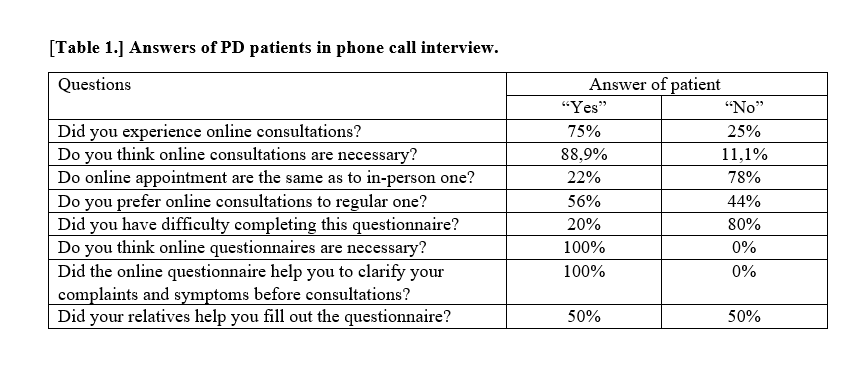Category: Technology
Objective: The aim of the study is to identify challenges for telemedicine in treatment among patients with parkinsonism in Kyrgyzstan and Kazakhstan.
Background: The covid-19 pandemic, low number of specialists in the region, and geographical challenges have provoked a launch of online consultations in the Movement Disorders Service in Bishkek, Kyrgyzstan. Telemedicine is now being used in practice of our office to solve problems with access to treatment among parkinsonian patients.
Method: In this study, we conducted interviews with Parkinson’s disease patients from Kyrgyzstan and Kazakhstan. The interviews were performed by phone calls in Russian and Kyrgyz languages, and questions were related to topics about online consultations and preparation to online appointments, including the pre-appointment questionnaire. An average time for the interview was 8-10 min.
Results: 12 patients from these countries were interviewed about the necessity and usefulness of online appointments. As a result, 78% of patients considered in-person appointments better than online due to their concerns on possibility of motor symptoms assessment by the physician online. Nevertheless, 56% of patients confirmed that they would prefer an online appointment. Only 1 patient experienced difficulties with connecting to an online consultation.
The majority of respondents indicated that pre-appointment online questionnaires helped them prepare to appointments and save time for consultations. Full data is provided in [Table 1].
According to patients, the most remarkable questions in the pre-questionnaire were related to non-motor symptoms, while the most problematic ones were a part of motor symptoms and current treatment. Thus, in 78% of cases, the video call time was exceeded due to communication issues mostly related to patients’ understanding of symptoms and limited ways for an explanation.
Conclusion: Telemedicine in the management of patients with movement disorders is necessary as it solves the main problems with access to treatment. With the rise of telemedicine, a strong need for development of convenient tools for improvement of movement disorders services is intensifying. It is also recommended to increase the number of patient education sessions on non-motor symptoms, motor complications, patient-relative relationships, as well as to create video content on well-being and self-management in local languages.
To cite this abstract in AMA style:
A. Iliazova, E. Zhunusova, C. Shambetova. Telemedicine challenges in the management of patients with Parkinson’s disease in Central Asia. [abstract]. Mov Disord. 2023; 38 (suppl 1). https://www.mdsabstracts.org/abstract/telemedicine-challenges-in-the-management-of-patients-with-parkinsons-disease-in-central-asia/. Accessed February 9, 2026.« Back to 2023 International Congress
MDS Abstracts - https://www.mdsabstracts.org/abstract/telemedicine-challenges-in-the-management-of-patients-with-parkinsons-disease-in-central-asia/

